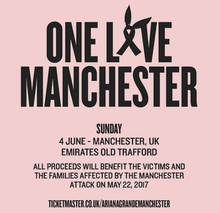The One Love Manchester benefit concert, held on June 4th, 2017, emerged in response to the tragic events that unfolded on May 22, 2017, during Ariana Grande’s concert at the Manchester Arena. On that fateful night, a suicide bomber detonated an explosive device as concertgoers were exiting the venue, resulting in 22 deaths and leaving over 800 people injured. The attack not only targeted the young and vibrant audience of Ariana Grande but also struck at the heart of a city known for its cultural diversity and resilience.
In the immediate aftermath, the outpouring of grief and solidarity was palpable. Vigils were held across Manchester and beyond, as communities came together to mourn the victims and support their families. The tragedy also prompted a wave of global reactions, with world leaders, celebrities, and ordinary citizens expressing their condolences and condemnation of the senseless violence. Ariana Grande herself was deeply affected, taking to social media to express her sorrow and commitment to helping those affected.
Swiftly, plans for a benefit concert began to take shape. The One Love Manchester concert was organized in just two weeks, showcasing a remarkable display of unity and cooperation among artists, organizers, and the local community. The concert featured a star-studded lineup including Justin Bieber, Katy Perry, and Coldplay, among others, all of whom performed without charge. The event was broadcast live to millions worldwide, raising over £10 million for the We Love Manchester Emergency Fund.
The historical significance of One Love Manchester extends beyond its immediate charitable impact. It stood as a defiant symbol of unity, resilience, and the healing power of music in the face of terrorism. The concert sent a powerful message of hope and solidarity, demonstrating that love and community can triumph over hatred and fear. The global response further underscored the broader social and cultural implications, as individuals from different backgrounds and nations united in support of Manchester. News articles, interviews, and official statements from the time reflect the concert’s profound impact, capturing its essence as a beacon of hope and a testament to human resilience.
Performances, Fundraising, and the Legacy of One Love Manchester
The One Love Manchester concert, held on June 4, 2017, at Old Trafford Cricket Ground, was a poignant event aimed at healing and unity in the wake of the tragic Manchester bombing. The concert featured an array of performances by Ariana Grande, who spearheaded the event, along with other prominent artists such as Coldplay, Miley Cyrus, Justin Bieber, and Katy Perry. Each performer brought a unique energy to the stage, contributing to an emotionally charged and uplifting atmosphere.
Ariana Grande opened the concert with a heartfelt rendition of “Be Alright,” setting a tone of hope and resilience. Coldplay’s Chris Martin delivered a moving performance of “Fix You,” while Miley Cyrus joined Grande for a powerful duet of “Don’t Dream It’s Over.” Justin Bieber’s acoustic versions of “Love Yourself” and “Cold Water” resonated deeply with the audience, and Katy Perry’s energetic performance of “Roar” and “Part of Me” further amplified the concert’s spirit of defiance and solidarity.
The logistical execution of the concert was a considerable feat. It drew an audience of approximately 50,000 people, with comprehensive security measures ensuring their safety. The event was broadcast live on multiple platforms, reaching millions of viewers worldwide. This extensive outreach not only amplified the message of unity but also significantly boosted the fundraising efforts.
Financially, the concert was a resounding success, raising over £10 million for the We Love Manchester Emergency Fund. These funds were instrumental in providing support to the victims and families affected by the bombing. The outpouring of donations and the global solidarity demonstrated through this event underscored the power of music to bring people together in times of crisis.
The legacy of One Love Manchester extends far beyond the funds raised. It set a precedent for benefit concerts, showcasing how the music industry can mobilize quickly and effectively in response to tragedy. The concert emphasized the role of music as a catalyst for healing and community, a theme that continues to resonate in subsequent events and discussions. The One Love Manchester concert remains a testament to the enduring power of unity and the human spirit in the face of adversity.

